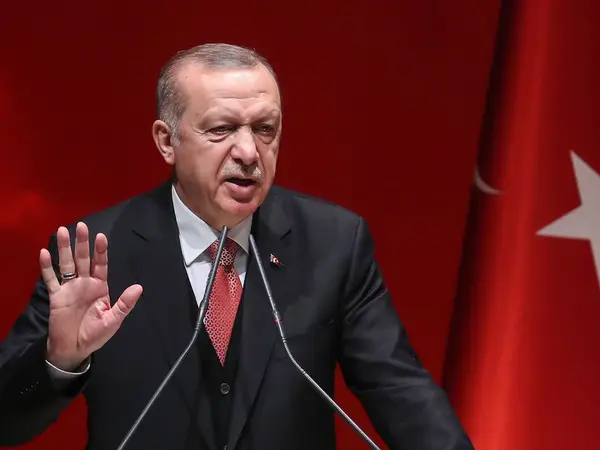Iran is in no position to "target Azerbaijan" for relations with Israel for fear of its own Azari population, Turkish President Recep Tayyip Erdogan has said.
Referring to a reporter’s question on whether recent Iranian military maneuvers would “escalate into a hot crisis” in the Caucasus, Erdogan said he had "no such expectation," according to a government English-language news release.
Because of Baku’s relations with Israel, “Iran will not be hostile to Azerbaijan or put Azerbaijan on the target list” because its own Azaris were “noticeable,” the president said.
During the 2020 conflict between Azerbaijan and Armenia, some among Iran’s Azaris, around a quarter of the 80 million population, expressed sympathy for Baku’s cause.
But Erdogan, speaking to reporters on a plane returning from an African tour also played down tensions between Iran and Azerbaijan, which relaxed this week with Thursday’s release of two Iranian truck drivers arrested on a transit route to Armenia now under Azerbaijani control.
"It is not that simple,” the president said. “What has been done thus far [by Iran] is inappropriate, and I believe that Iran's new administration will not repeat this misstep.”
The first to fall in
Iranian authorities have not commented on Erdogan’s remarks, the first from a senior Turkish figure on Iran's military drills near the Turkish border and the recent standoff between Tehran and Baku. Iran's Supreme Leader Ali Khamenei on October 3 highlighteda reported Israeli military presence in Azerbaijan and appeared to refer to Turkey's role in warning that "the person who digs a well [to trap] for his brothers is the first one to fall into it."
Iran is also concerned at the reported presence of jihadist fighters from Syria in Azerbaijani territory allegedly recruited by Turkey to help Baku in its war against ethnic Armenians in and around Nagorno-Karabakh during last year's conflict. Turkey and Azerbaijan have denied the allegation.
The Turkish president's comments came as tensions between Tehran and Baku appeared to ease since last week’s phone-call between the Iranian and Azerbaijani foreign ministers. In a meeting with lawmakers from East and West Azarbaijan provinces Thursday, President Ebrahim Raisi (Raeesi) stressed that good relations with neighboring countries was a government priority, and that Iran would not allow Israel to sabotage them.
In a December 2020 speech to a victory parade in Baku after the Azerbaijan-Armenia war,
Erdogan recited a folk poem, popular both in both Azerbaijan and the Iranian Azari provinces, lamenting the division of the ethnic Azari by the river Aras separating Azerbaijan and Armenia from Iran.
Sultan of illusion
Iran's foreign ministry summoned the Turkish ambassador, while foreign minister Mohammad Javad Zarif reacted with uncharacteristic vigor. Much of the Iranian media dubbed the Turkish president the 'Sultan of illusion.'
Erdogan also in the speech referred to "one nation, two states," citing Turkey and Azerbaijan’s shared linguistic heritage. "One nation" is often used by pan-Turks to express the unity of speakers of all Turkic languages, across central Asia and including Azerbaijan and Iran’s north-west Azari-populated northwest.
Pan-Turkism has been on the rise among Azari (Torki) speakers of Iran in the past two decades. Separatist groups call Iran’s northwestern regions ‘South Azerbaijan.’ The Turkic languages spoken in Iran's northwest and some other parts of Iran have fed a movement advocating unification of speakers in Iran and the Republic of Azerbaijan, whose territory was part of Iran until the early nineteenth century when ceded to the Russian empire.
